Vous devez être connecté
-
revenirX
-
Composants
-
-
Category
-
Semi-conducteurs
- La diode
- Les thyristors
- Modules de puissance isolés
- Ponts redresseurs
-
Transistors
- Transistors | GeneSiC
- Modules MOSFET SiC | Mitsubishi
- Modules MOSFET SiC | STARPOWER
- Modules MOSFET SiC ABB
- Modules IGBT | MITSUBISHI
- Modules de transistors | MITSUBISHI
- Modules MOSFET | MITSUBISHI
- Modules de transistors | ABB
- Modules IGBT | POWEREX
- Modules IGBT | INFINEON (EUPEC)
- Composants semiconducteurs en carbure de silicium
- Aller à la sous-catégorie
- Circuits de commande
- Blocs de puissance
- Aller à la sous-catégorie
- Transducteurs électriques
-
Composants passifs (condensateurs, résistances, fusibles, filtres)
- Résistances
-
Fusibles
- Fusibles miniatures pour c.imp. série ABC et AGC
- Fusible rapides tubulaires
- Cartouches de courbe GL/GG et AM
- Cartouches ultrarapides
- Fusibles à action rapide (norme britannique et américaine)
- Fusibles à action rapide (norme européenne)
- Fusibles de traction
- Cartouche de haute tension
- Aller à la sous-catégorie
-
Condensateurs
- Condensateurs pour moteurs
- Condensateurs électrolitiques
- Condensateurs de type snubbers
- Condensateurs de puissance
- Condensateurs pour circuits continus
- Condensateurs de compensation de puissance
- Condensateurs de haute tension
- Condensateurs pour chauffage par induction
- Condensateurs pour impulsions
- Condensateurs DC LINK
- Condensateurs pour circuits AC/DC
- Aller à la sous-catégorie
- Filtres anti-interférences
- Supercondensateurs
-
Protection contre les surtensions
- Protection contre les surtensions pour les applications coaxiales
- Protection contre les surtensions pour les systèmes de vidéosurveillance
- Parafoudres de ligne électrique
- Protection contre surtensions pour LED
- Parafoudres pour le photovoltaïque
- Protection du système de pesage
- Protection contre les surtensions pour bus de terrain
- Aller à la sous-catégorie
- Aller à la sous-catégorie
-
Relais et contacteurs
- Théorie relais et contacteurs
- Relais statiques triphasés
- Relais statiques CC
- Régulateurs, circuits de commande et accessoires
- Démarrages progressifs et contacteurs inverseurs
- Relais electromécaniques
- Contacteurs
- Commutateurs rotatifs
-
Relais statiques monophasés
- Relais semi-conducteurs AC monophasés, série 1 | D2425 | D2450
- Relais à semi-conducteurs CA monophasés, séries CWA et CWD
- Relais à semi-conducteurs CA monophasés des séries CMRA et CMRD
- Relais à semi-conducteurs CA monophasés, série PS
- Relais semi-conducteurs AC double et quadruple, série D24 D, TD24 Q, H12D48 D
- Relais statiques monophasés, série GN
- Relais à semi-conducteurs CA monophasés, série CKR
- Relais AC monophasés SÉRIES ERDA ET ERAA pour rail DIN
- Relais CA monophasés pour courant 150A
- Relais à semi-conducteurs doubles intégrés à un dissipateur thermique pour un rail DIN
- Aller à la sous-catégorie
- Relais statiques monophasé pour c.imp.
- Relais d'interface
- Aller à la sous-catégorie
- Composants inductifs
- Radiateurs, varistances, protections thermiques
- Ventilateurs
- Climatiseurs et accessoires d'armoires électriques
-
Batteries, chargeurs, blocs d'alimentation tampon et onduleurs
- Batteries et Chargeurs - théorie
- Batteries Li-ion et non-standards. Systèmes de gestion des batteries (BMS)
- Batteries
- Chargeurs de batteries et accessoires
- Alimentation de secours UPS et alimentation tampon
- Convertisseurs de tension et accessoires pour photovoltaïque
- Stockage d'Energie
- Réservoirs de carburant
- Batteries lithium-ion
- Aller à la sous-catégorie
-
Automatique industrielle
- Futaba Drone Parts
- Interrupteurs de fin de course, micro-rupteurs
- Capteurs et convertisseurs
- Pyromètres
- Compteurs, Relais temporisés, Indicateurs de tableau
- Appareils industriels de protection
- Signalisation lumineuse et sonore
- Caméra thermique
- Afficheurs à LED
- Boutons et commutateurs
-
Enregistreurs
- Enregistreur de température à bande et afficheur numérique - AL3000
- Enregistreurs à microprocesseur avec ecran LCD série KR2000
- Enregistreur KR5000
- Indicateur avec fonction enregistrement de température et humidité HN-CH
- Matériaux consommables pour enregistreurs
- Enregistreur graphique compact 71VR1
- Enregistreur KR3000
- Enregistreur PC série R1M
- Enregistreur PC série R2M
- Enregistreur PC, 12 entrés isolées – RZMS
- Enregistreur PC, USB, 12 entrées isolées – RZUS
- Aller à la sous-catégorie
- Aller à la sous-catégorie
-
Câbles et chemins de câbles
- Fils
- Fils de Litz
- Câbles pour les applications spéciales
- Gaines
-
Tresses
- Tresses plates
- Tresses rondes
- Tresses très souples - plates
- Tresses très souples - rondes
- Tresses cuivre cylindriques
- Tresses cuivre cylindriques et protection
- Bandes de mise à la terre souples
- Tresses en acier zingué et inox
- Tresses isolantes en PVC - temp. 85°C
- Tresses plates en aluminium
- Kit de liaison - tresses et gaines
- Aller à la sous-catégorie
- Equipement pour la traction
- Cosses
- Barres flexible isolées
- Barre flexibles multicouches
- Systèmes de traçage des câbles
- Gaines annelées, tuyaux
- Aller à la sous-catégorie
- Voir toutes les catégories
-
Semi-conducteurs
-
-
- Fournisseurs
-
Applications
- Alimentations (UPS) et systèmes de redressement
- Automatisation HVAC
- Chauffage par induction
- Composants pour atmosphères potentiellement explosives (EX)
- Dispositifs de protection industriels
- Energy bank
- Équipements pour armoires de distribution, de contrôle et de télécommunications
- Impression
- L'automatisation industrielle
- L'automatisation industrielle
- Machines à souder et machines à souder
- Machines de séchage et de traitement du bois
- Machines pour le thermoformage des plastiques
- Machines-outils CNC
- Mesure et régulation de la température
- Mesure et régulation de la température
- Mines, métallurgie et fondation
- Moteurs et transformateurs
- Traction de tram et de chemin de fer
- Variateurs CA et CC (onduleurs)
-
Installation
-
-
Inducteurs
-
-
Appareils à induction
-
-
https://www.dacpol.eu/pl/naprawy-i-modernizacje
-
-
Service
-
- Contact
- Zobacz wszystkie kategorie
Quel est le principe de fonctionnement des tentes et toiles EMC ?

We have made over 250 tents, we can create one that will meet all your needs!
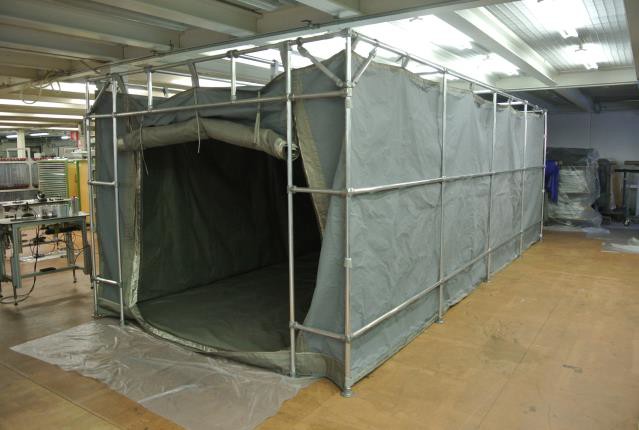
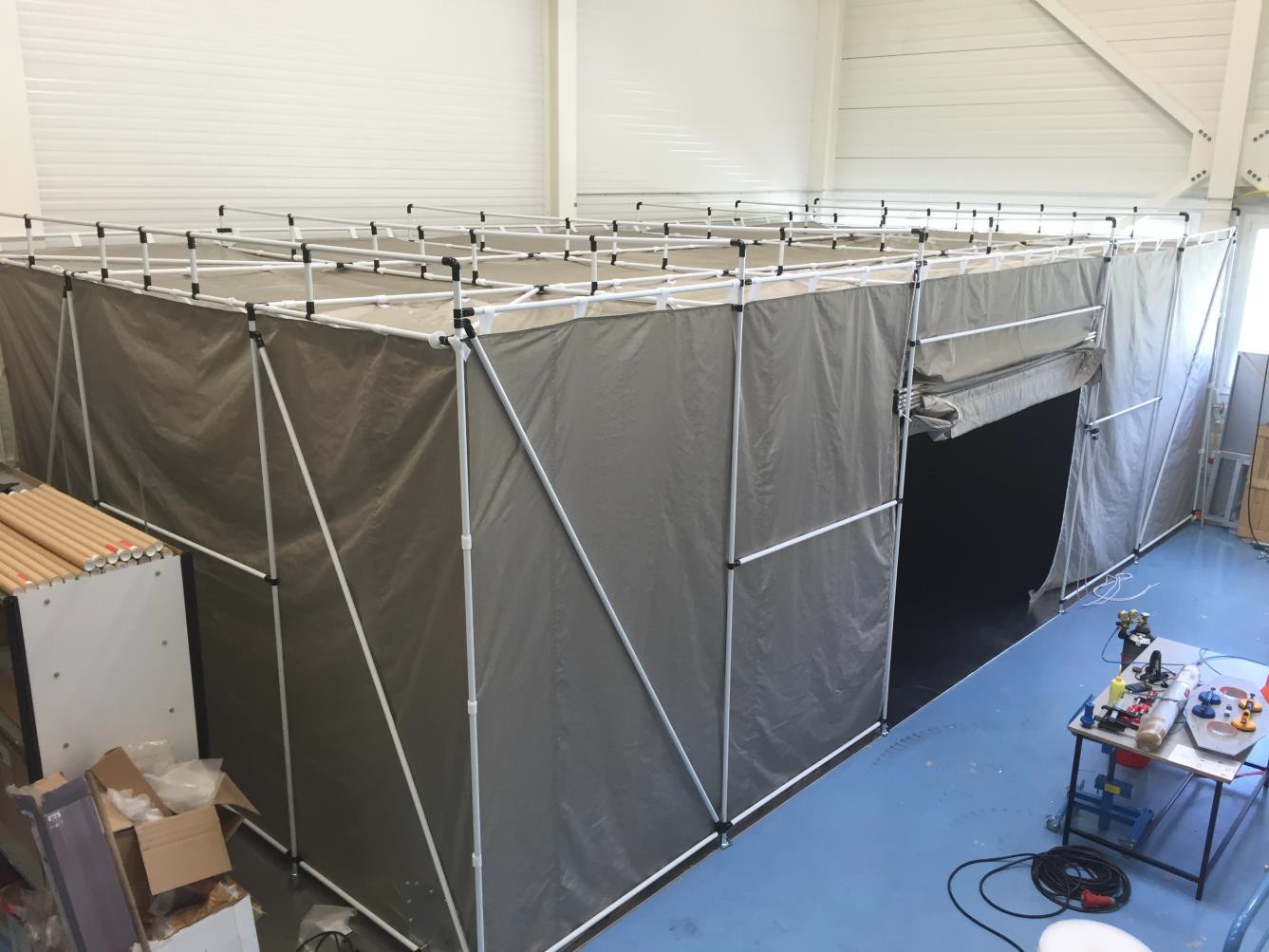
To ensure that the portable shielded test tent meets RF insulation requirements, the supplier's shielding performance data should be carefully analyzed to verify that they meet the minimum shielding requirements. SOLIANI EMC uses third party IEEE: 299-2006 tests to measure the minimum shielding effectiveness achieved on fully assembled enclosures at different locations in the tent at different frequencies. This test on a Soliani EMC high-attenuation tent with internal vestibule resulted in attenuation of at least -85.7 dB from 1 MHz to 18 GHz during taking measurements through the wall at multiple locations.
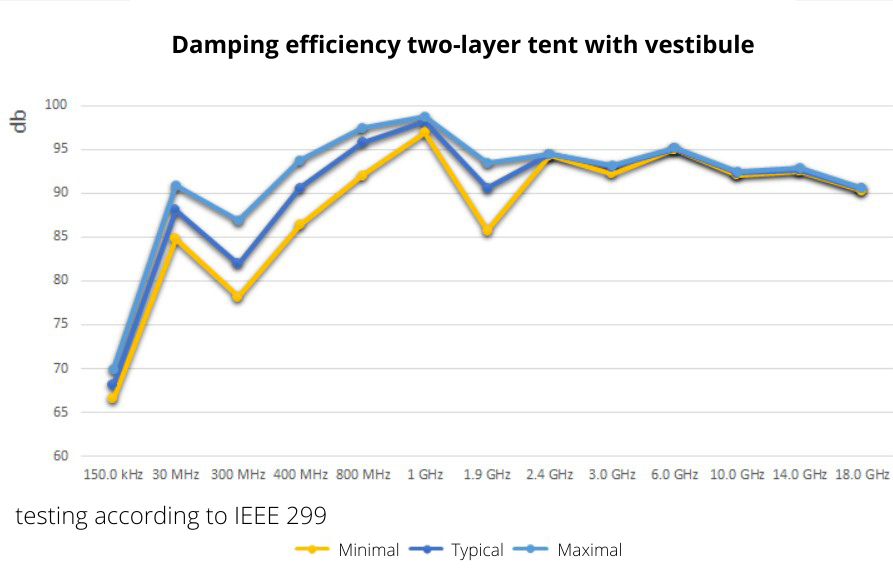
Specification
Made in Italy with metallized material in Italy.
Standard portable damping tent enclosures include:
- Multiple layers of Galileo conductive fabric
- White ESD fabric layer inside the tent (on request),
- Internal or external vestibule entry system,
- Single or double patented door sealing systems,
- Steel or inflatable frame,
- Efficient power and data filtering,
- Complete screened ventilation system,
- RF shielded floor between two layers of heavy duty tarpaulin,
- A bag for storing and transporting the tent,
- Full installation instructions.
Patented door system
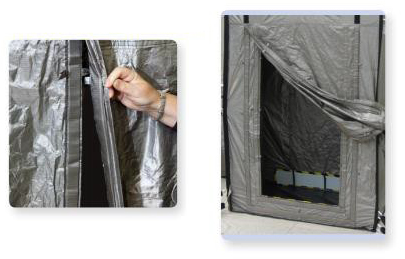
The exclusive, patented SOLIANI EMC door sealing system ensures insulation of the inner casing. The operations carried out inside the enclosure need not be interrupted when exiting and entering the tent. The patented single door sealing system includes a lightweight, easy-to-use double magnet closure that maximizes RF isolation and EMI shielding. Both internal and external doors are equipped with the exclusive SOLIANI EMC door system.
EMI / RFI screened tents are made of highly conductive, lightweight and very strong textile material. As standard, screened tents come with multiple ropes so they can be easily attached to the ceiling or they can be equipped with a free-standing rack.
Typical applications are EMC experiments, RF measurements, mobile military or forensic operations, and personal protection in the field. Faraday tents offer a mobile solution for a fraction of the cost of a conventional Faraday cage.
Mounting options

Applications
Automotive
The connectivity megatrend also continues in the commercial vehicle industry. Everyone wants and needs to be connected everywhere. To ensure this, the number of radio services and the use of their channels are increasing. However, the existing frequency bands were no longer sufficient, so we had to switch to slower higher frequencies. In addition to connectivity, the automotive industry also focuses on safety and seamless functionality , therefore the tested frequency range was extended from the Super High Frequency (SHF) range immunity test.
But as we know, the shading theme in the absorber hall grows with increasing frequency, while the transmission lobes of the measurement antennas decrease. However, more and more antenna positions are required as the frequency increases to ensure the desired test range. This is especially true for long and large vehicles.
The measurement method in the turbulence mode (MTC) chamber does not present this problem. Due to the desired reflections on the chamber walls, the test object is immediately exposed to the test field from all sides and directions due to the statistical homogeneity of the field.
Measurement
As you know, there are two different measurement options in one MTC. First, the "tuned mode" in which the stirring mode rotates step by step and then measures, and the "stirring mode" in which the mode is continuously rotated and measured simultaneously.
"Tuned Mode" requires, on the one hand, solid walls and a stirrer. On the other hand, the measuring process is very time-consuming as each stirrer position has to be measured and the decomposition time is required. This does not mean a time advantage over a few antenna positions and is therefore not of interest to the automotive industry.
W takim przypadku pozostaje „tryb mieszania”, w którym podczas pomiaru na badanym obiekcie ustawiane jest średnie natężenie pola. Średnia siła pola zależy od komory, mieszadła i samej próbki. Czysta kontrola wzmacniacza (otwarta pętla) za pomocą krzywych charakterystycznych wymagałaby czasochłonnej kalibracji. Dlaczego warto wybrać system o kontrolowanym natężeniu pola z 8 szybkimi sondami polowymi (zamknięta pętla).

Figure 1: Bus in the test field, field probe on the mast (1).
8 probes, see Figure 7 (1), span the test volume. They are placed on four PVC masts surrounding the vehicle. The distance to the vehicle should be & gt; 1 m and more than? / 4 below the frequency from the walls [6].
The antenna should not be aimed directly at the vehicle, but at the oscillating device behind the movable wall.

Figure 2: Truck in test field, specific test volume in columns is irradiated with LogPer antenna.
According to [7], a statistically homogeneous field dominates the VIRC test volume if the standard deviation (at f ≥ 400 MHz) of the field strength of all probes is less than σ = 3. The multi-probe measurement system used automatically reported this value, which meant that the calibration was not necessary.
Space and laboratory
When the equipment is too large or requires special conditions (loads, drives, water, emission of toxic fumes, etc.), testing in a typical semi-anechoic room may not be feasible. Temporary screen rooms consisting of a hardware cloth can be built around the test area to reduce the environment for radiation emission testing and limit the RF field during radiation susceptibility testing. Since the room can reflect light strongly, care should be taken to identify any resonances. Several antenna positions may be required to reduce the resonance effect.
Characteristics
- Semi-durable, easier to install, store and transport than metal wall chambers,
- Lower cost and weight than a permanently welded screened chamber,
- 10:1 weight ratio for welded room with screen,
- Removable "hardware cloth" panels,
- Inner frame,
- Attenuation over 70 dB in the range from 20 MHz to 18 GHz (IEEE ™ 299),
- Made of conductive Ni fabric covered with acrylic,
- Optional cleaning in accordance with ISO Class 7 (Class 10,000 -Fed. Std. 209).

Military
SOLIANI EMC RF insulated tents are designed for portable, secure communication * applications where specific signal attenuation is required. Our RF protective pouches are also designed to isolate wireless communication devices. Soliani EMC's engineering staff will also work with your team to design bespoke lightweight, foldable and secure RF security solutions to meet your requirements. SOLIANI EMC can secure your electronics including laptops, printers and communication devices, systems with RF Security portable table tents. Safe Tempest keyboards, high-damping power filtering and shielded RF windows allow full access to standard laptops.
SOLIANI EMC has worked with many government agencies providing RF security applications. RF isolation for police and emergency response agencies, transport security, including air and maritime transport, research into next-generation security technologies.

Registered with NATO
Registered with ITAR - US Department of State - Office of Defense Trade Compliance
Cage Code: A1040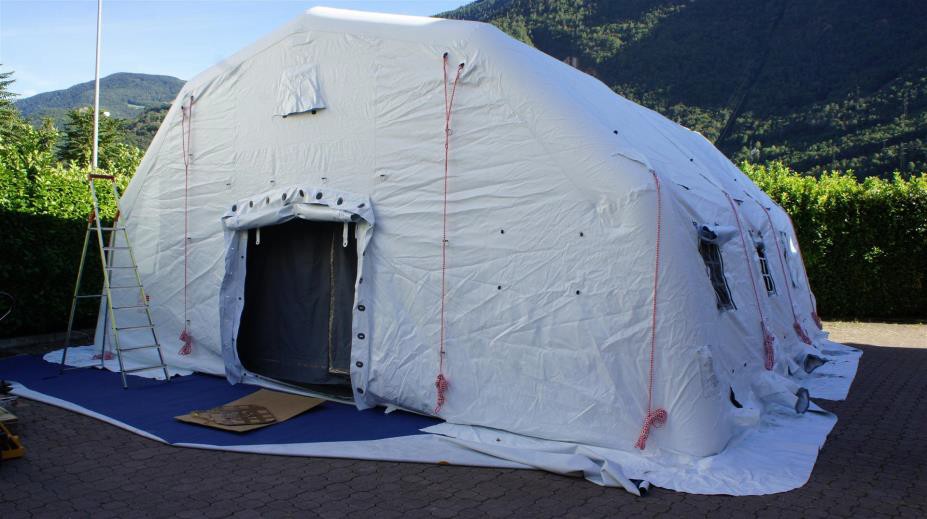
(*) RF isolation is part of a secure communication protocol. Make sure your operation complies with all sections of the protocol.
Produit associé
Articles similaires
 Now available – DC/DC converters from PREMIUM
Now available – DC/DC converters from PREMIUM
 New release in DACPOL lighting for lathes – Kira covers
New release in DACPOL lighting for lathes – Kira covers




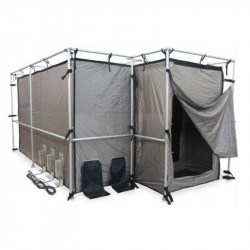
Laissez un commentaire